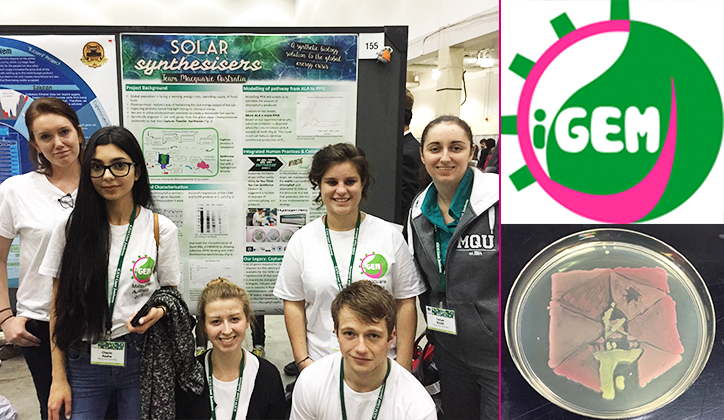For the second year running, a team of undergraduate students from Macquarie’s CBMS 330 course have brought home gold from the International Genetically Engineered Machine (iGEM) jamboree in Boston, Massachusetts.
The iGEM competition involves students engineering genetic material and transferring it into the bacterial species E.coli, imparting it with new biological functions.
Since 2013 the Macquarie University iGEM teams have been working toward endowing E.coli with the genes required to produce chlorophyll, the pigment in plants that allows them to harness the energy from sunlight. The 2015 team have gone on further and engineered E.coli to express photosystem II, the photosynthetic protein complex uses the captured energy to split water.
The team’s chief advisor, Dr Louise Brown, said that this year’s team showed fantastic ability on the global stage, and with real application addressing a major global issue.
“The global population faces a looming energy crisis with fossil fuels supplies dwindling. Alternative energy sources must be discovered and developed for future energy security.
“The goal of Macquarie University’s 2015 iGEM team – the Solar Synthesisers – is to utilise the solar-harnessing powers of chlorophyll and photosystem II in order to produce an environmentally friendly and renewable source of chemical energy, namely hydrogen gas.”
In total, 31 undergraduate students from the Department of Chemistry and Biomolecular Sciences took part, and spent several months developing their project before the competition on 24 – 28 September.
“We were able to complete the genes within the chlorophyll biosynthesis pathway, and construct 14 out of the 17 photosystem-II genes into ‘biobricks’. We also modelled sections of the chlorophyll biosynthesis pathway so we could best understand how much hydrogen gas could be obtained from our engineered bacteria. The whole team is so proud of that achievement,” said team member Lauren Wunder.
“The whole experience, including the months in the lead up to the Jamboree, was a great opportunity for us to develop our skills and knowledge of synthetic biology, and then test them against 259 teams from around the world.”
The Macquarie team received three category nominations for their project, which included ‘Best Energy Project’, ‘Best Model’ and ‘Best New Basic Part’.
Distinguished Professor Ian Paulsen said he was pleased to see the ongoing success of Macquarie’s students in an area that our own scientific expertise excels in.
“Macquarie has a great interest and expertise in synthetic biology. It’s great to see the enthusiasm and creativity in our next generation of synthetic biologists.”
Visit the team’s wiki for more details about the project.
Follow the team on:
YouTube
Facebook
And Twitter: @MQ_AUST_iGEM

